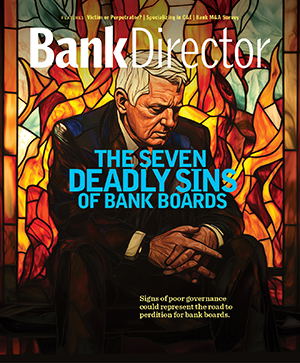Jackie Stewart is the Executive Editor of Bank Director. She is responsible for writing and editing features for the company’s weekly newsletter and quarterly print magazine and oversees sponsored research reports. Jackie is particularly interested in community banking and M&A activity. She previously served in a number of reporter and editor roles with American Banker, including executive editor of American Banker Magazine. She has also covered retirement issues for Kiplinger and spent two years teaching middle school literacy in the Bronx, New York, through Teach For America.

Chaos Consumes CFPB, Causing Uncertainty
As leadership changes at the Consumer Financial Protection Bureau, banks are left waiting to see what rules might be undone.
The Consumer Financial Protection Bureau is going through a tumultuous period, and that’s left banks wondering what to expect from the agency.
Earlier this month, Russell Vought, the agency’s second acting director since President Donald Trump’s inauguration, shut down the CFPB’s offices and told employees to stop their work immediately. He also announced he would decline the agency’s latest round of funding from the Federal Reserve. As of publication early Friday morning, all of the agency’s probationary employees were let go. The potential for more layoffs continues to loom, although a federal judge has ordered the Trump administration to halt layoffs and other actions pending a court hearing.
This is a significant shift from the previous administration, which fully embraced the work of the CFPB. Under Rohit Chopra, who served as the agency’s director under former President Joe Biden, the CFPB produced a number of rules that frustrated the banking industry and resulted in litigation.
In addition to that, under Chopra, the agency levied more fines than during the previous Trump term. From 2021 to 2024, enforcement actions resulted in roughly $3.4 billion in penalties, compared with less than $1 billion in penalties from 2017 to 2020 during Trump’s first term, according to data from the CFPB website.
It’s likely banks will welcome a slower pace of new regulations from the agency and a pullback in terms of enforcement. But the current turmoil has also created confusion.
“There is clearly a reset,” says Ivan Cilik, a principal in advisory and tax firm Baker Tilly’s audit and accounting services group. “I think overall the theme is wait and see for the banks for a little bit. It definitely will be very different for the next four years compared with the last four years.”
During a recent town hall at JPMorgan Chase & Co., CEO Jamie Dimon criticized the CFPB as having “massively overstepped their authority,” according to Reuters, which reviewed a recording of the meeting. But Dimon also recognized the hardship for banks when “policies flip back and forth” and argued that consistent policies were better, according to Reuters.
“The uncertainty is bad,” says Eugene Ludwig, a former comptroller of the currency under President Bill Clinton and founder and CEO of the consulting firm Ludwig Advisors. “Banks can gear up and follow the law pretty well if they know what it is. What is really difficult is trying to figure out does this apply? Will it ever be enforced? Will it be from the other banking agencies? That makes it chaotic for bank management and the boards to figure out what they should do.”
There are a few rules that were more recently finalized that seem to be particularly in limbo. These include a rule capping credit card late fees and another that limits overdraft fees.
Section 1071, which relates to the collection of small-business lending data, has three rolling implementation dates through this year and next, depending on an institution’s volume of this type of lending. The rule prohibiting including certain types of medical debt in credit reports was scheduled to go into effect in March.
It’s likely that the new leadership at the CFPB would seek to tweak or vacate some of these rules and others, though no detailed plans have been released yet. To unwind a regulation, the CFPB would need to follow the Administration Procedure Act, the law that dictates how federal agencies create and enforce regulations, and that could take time.
“It isn’t magic. The CFPB has to follow the rule of law,” says Brian Fink, a lawyer at McGlinchey Stafford who advises banks on compliance and regulatory issues. “You have to follow the proper process.”
Additionally, Congress could look to roll back some of these regulations through the Congressional Review Act, which allows lawmakers to overturn final rules issued by federal regulators within a certain timeframe. Republicans, who now control both chambers of Congress, have vowed to take this step with the cap on overdraft fees.
Additionally, these rules have faced litigation that already threw their future into question, and these lawsuits could lead to their demise. In addition to closing its offices, CFPB leadership has stayed its legal work for the time being. That could mean the agency mounts a less vigorous defense of these rules or abandons these efforts entirely.
Given the uncertainty, how much banks should prepare for these rules depends on how close the implementation date is, Fink says. For example, the medical debt rule is supposed to take effect next month. That means that the industry should be fairly far along in being able to abide by it, even if the courts vacate it or the CFPB decides to reverse it. If an implementation date is further away, then banks could slow their preparations to see what the CFPB’s new leadership decides, what actions Congress takes or how the courts rule.
In general, banks should continue to follow any regulation that the agency has finalized and that has been published in the Federal Register. Failure to comply could open the bank up to regulatory action.
This is true, even if the CFPB itself takes a significant step back in its own enforcement. There are a number of other entities, including state attorneys general, that could fill this enforcement void, and it seems likely that this could happen, at least in some states. In January 2025, just before he left his post, Chopra’s agency released a document titled “Strengthening State-Level Consumer Protections.” It was seen as a roadmap for other agencies to follow to enforce consumer protection laws.
Banks should also keep in mind that the regulatory pendulum is likely to swing significantly back in the other direction, if Democrats retake the White House. Because of that possibility, banks shouldn’t completely gut their compliance departments and efforts under the assumption that there will be less enforcement in the interim. Experienced compliance officers are hard to come by and it could prove difficult for banks to beef up staff.
“I don’t think it would be good bank management to say, ‘Last year we spent X on compliance. Let’s spend 60% of that and let those cost savings run to the bottom line,’” says Greyson Tuck, president of the law firm Gerrish Smith Tuck. “You may see some of that but I would be wary of a bank doing that. Four years from now we could be talking about how the CFPB is getting the band back together again.”
There are hopes that the current chaos will be short lived and that a permanent director will soon take over and bring clarity to these issues. Trump has nominated Jonathan McKernan, who has served as a Republican board member of the Federal Deposit Insurance Corp. since January 2023, to lead the CFPB on a permanent basis, though he still needs to be confirmed by the Senate.
If confirmed, McKernan seems likely to be less aggressive in rulemaking, and he has made statements in the past critical of over-regulation of the industry.
“I think [the Trump administration] isn’t going to change the mission but how they do it,” Cilik says. “There is a balance of protecting customers and protecting investors and those missions are critical to our economy and trust in the capital markets. There will be some time to allow the new leaders to get into place and see what the new direction and changes will look like.”


